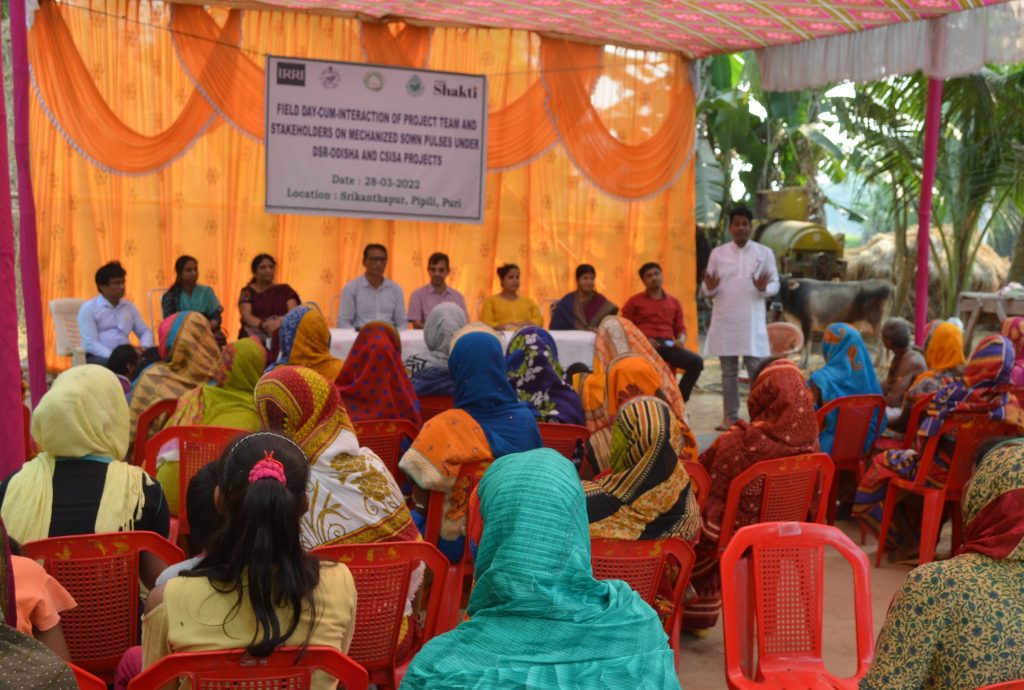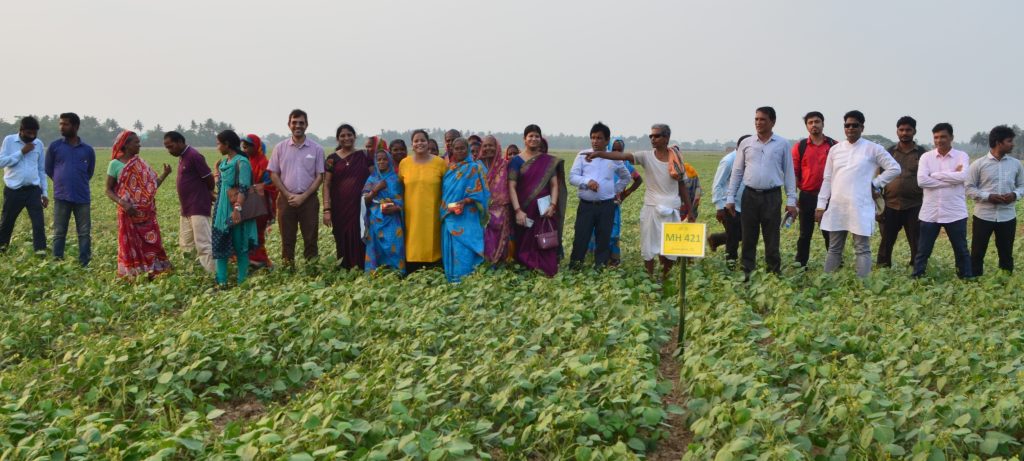Convergence between DSR Odisha Project-CSISA-Mission Shakti and the Department of Agriculture empowering small and marginal farmers in Odisha

Background
“Precision direct seeded rice based diversified systems for transforming labour requirement, yields and profitability of smallholder farmers in Odisha” in short “DSR-Odisha project” funded by the Government of Odisha is being implemented by International Rice Research Institute (IRRI) since Rabi 2021-22 in collaboration with Department of Agriculture & Farmers’ Empowerment (DAFE). The project aims to increase productivity and ensure socio-economic and environmental sustainability while improving smallholders’ profitability in rice-based systems by catalysing wide-scale adoption of mechanized and precision broadcast DSR during Kharif and demonstrating non-rice crops during the Rabi season. With a convergent approach with CSISA and partnership with public and private sectors, improved technologies and better bet agronomy are taken to farmers through a series of on-field demonstrations. Inclusion is an indispensable part of the approach. A collaboration between the Department of Mission Shakti and the Government of Odisha, with 600,000 Women’s Self-Help Group, has also been established.
A series of demonstrations, sequencing with Kharif rice (wet season), feasible Rabi crops (dry season) like green gram, black gram, groundnut, maize, and others have been demonstrated at various locations of the project in Bargarh, Ganjam, Kalahandi, Mayurbhanj, and Puri districts of Odisha.

Field day and interaction with the stakeholders
Considering the ongoing project, on March 28, 2022, a field day was organized on mechanized sown pulses at village Srikanthapur and mechanically sown Rabi crops under DSR-Odisha and CSISA project at Kothabada village of Puri district. Representatives from DAFE, DMS, local NGOs, and farmers, including service providers and agri-entrepreneurs, visited the plot sites of farmers who laid down demonstrations and adaptive trials and the IRRI-CSISA team.
During the visit, an interactive session was held with both men and women farmers. The opportunities and challenges around mechanized line sowing of rice and non-rice crops in both seasons were discussed. Farmers shared the challenges of timely availability of quality inputs, efficient/suitable machine availability, mechanized service provision/custom hiring service, monsoon variability, climate change, labor scarcity, high input, and operation cost. Further, the prospective solutions and opportunities were discussed by the progressive farmers of the area along with the representatives from DAFE and Mission Shakti like better bet agronomy practices, the importance of stakeholders’ collaboration and support, the convergence of ongoing schemes, farmers’ willingness to adopt new/validated technologies, high-quality seeds, retention and hence utilization of soil moisture for Rabi crops, govt. support system, suitable landscape, ample options for reducing the cost of production, drudgery reduction, premium grain production, etc.)
Dr. Virender Kumar, Senior Scientist – Weed Science/Systems Agronomy & Research Unit Lead – Climate-Adaptive Agronomy & Mechanization; Dr. Ashok Kumar, CSISA Odisha, and DSR Odisha Coordinator; Ms. Sugandha Munshi, Senior Specialist, and CSISA Gender Lead; Dr. Bidhan Mohapatra, Agricultural Economist, further elucidated on what can be achieved through these two projects.
After the meeting/discussion, the participants visited demo fields on mechanically line sown Rabi crops (green gram, black gram, groundnut, maize) and the green gram variety cafeteria of the farmer. During the interaction with farmer Lingaraj Rath, who led the demonstration, the participants were elated to know and see the crop growth in residual soil moisture even without supplement irrigation. Lingaraj Rath further explained the difference between the traditional cultivation practice and the current practice he followed as part of the demonstration. Also, the cost of cultivation is substantially less, and water use is extremely low or even nil sometimes.
The visiting women farmers also expressed interest in seeing the drill-sown DSR in Kharif. In the coming Kharif season, the project plans to conduct mega demonstrations on drill-sown DSR and organize exposure visits for interested stakeholders.
Moreover, seeing the performance of some varieties, women farmers on the spot expressed their interest in trying the mechanized line sowing with CT and the new varieties in their field in the coming season in consultation with their spouses. Many farmers requested the demo farmers for seeds and the project team to help them get mechanical sowing service in the coming seasons. The project team and the other stakeholders (DAFE, DMS, etc.) promised to extend all possible support to the interested farmers if the landscape and climate are feasible for the selected crops. Smt. Geetarani Nanda, BAO, Pipili and Smt. Jayalaxmi Sahoo, AAo, Pipili from Department of Agriculture and Farmers’ Empowerment and Smt. Swayam Mishra, BPC, and Pipili interacted with farmers and shared how their departments can support this program.
Way forward
During the interaction and field visit with partners and farmers, it was found that the scope for mechanically line sowing (MLS-CT) was enormous. MLS-CT layered with high-yielding and short-duration varieties of Rabi crops sequenced with drill-sown DSR or precision broadcast DSR or crop with any other establishment method (during Kharif season) can be explored. There is also a high scope of this system approach to be followed by farmers, including women agri-entrepreneurs of Odisha. The Government of Odisha’s present incentivization schemes on Kharif diversification, higher subsidy on farm machinery purchase for both men and women farmers, and the technical support of DSR- Odisha and CSISA project through convergence with public and private sectors can act as a catalyst in farmers adopting improved varieties and technology.
Contributors: Bidhan Mohapatra, Ashok Kumar, Virender Kumar, Sugandha Munshi
